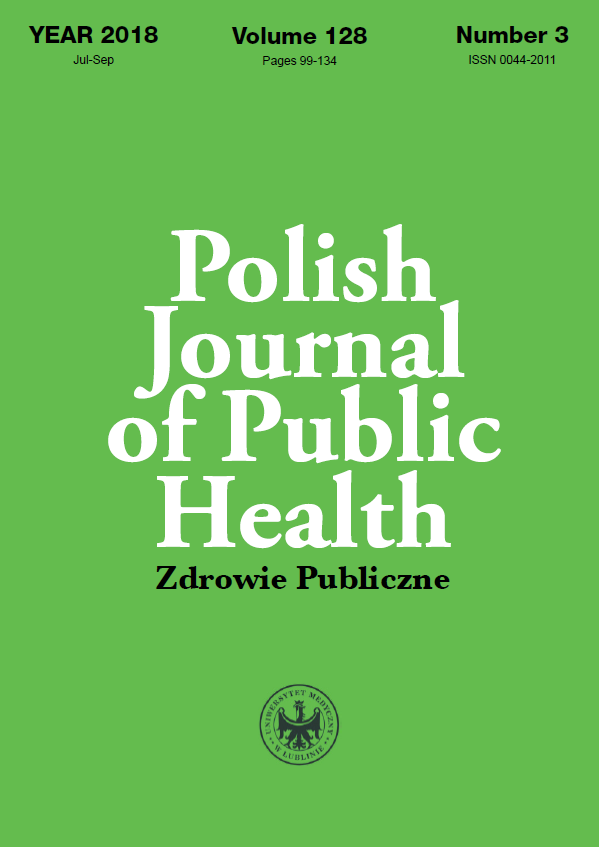Retrospective single-center analysis of the reasons and serious complications of peritoneal-related peritonitis in patients with end-stage renal disease undergoing peritoneal dialysis treatment
DOI:
https://doi.org/10.2478/pjph-2018-0019Keywords:
peritoneal dialysis, peritonitis, etiology, serious complicationsAbstract
Introduction. Peritonitis is still a serious complication of peritoneal dialysis (PD). Consequences of peritonitis can be severe. The most severe are peritoneal dialysis discontinuation and patient’s death. In majority, peritonitis is bacterial in the origin. Mainly there is a gram-positive infection, less commonly gram-negative one. Some peritonitis are culture-negative, because of former antibiotics use. In minority, fungal, tuberculous or even viral peritonitis are observed.
Aim. The aim of the present study is to analyze the number, origin and serious complications of peritoneal-related peritonitis cases found in our PD center.
Material and methods. We performed a retrospective five-years evaluation of medical records. The total number of peritonitis episodes was 56 cases, underwent by 30 adult patients on chronic peritoneal dialysis. Peritonitis was diagnosed according to ISPD recommendations. Causes and serious complications of peritoneal-related peritonitis were analyzed in every single year. Etiology of peritonitis was classified on the basis of the result of effluent dialysate culture as: gram-positive, gram-negative and culture negative. Peritoneal dialysis discontinuation or patient’s death were defined as serious complications.
Results. Among 56 cases of peritoneal-related peritonitis 44.6% were gram-positive, 26.8% gram-negative and 28.6% culture-negative. No fungal or tuberculosis peritonitis were found. Because of the peritonitis complications in the evaluated period, six patients discontinued peritoneal dialysis and were switched to hemodialysis (20%), two others died (6.7%).
Conclusion. The further improvement in peritonitis’ causes identification and treatment is needed in order to reduce number of serious complications in our medical center.
References
1. Higuchi Ch, Ito M, Masakane I, Sakura H. Peritonitis in peritoneal dialysis patients in Japan: a 2013 retrospective questionnaire survey of Japanese Society for Peritoneal Dialysis member institutions. Renal Replacement Therapy. 2016;2:2.
2. Wang Z, Jiang L, Feng S, et al. Early peritonitis is an independent risk fac¬tor for mortality in elderly peritoneal dialysis patients. Kidney Blood Press Res. 2015;40:298-305.
3. Tian Y, Xie X, Xiang S, et al. Risk factors and outcomes of high peritonitis rate in continuous ambulatory peritoneal dialysis patients. Medicine. 2016; 5:49.
4. Burkard JM. Microbiology and therapy of peritonitis in continuous peritoneal dialysis. Official reprint from UpToDate www.uptodate.com ©2017UpToDate®
5. Akoh JA. Peritoneal dialysis associated infections: An update on diagnosis and management. World J Nephrol. 2012;1(4):106-22.
6. Ren W, Lan L, Jin Y, et al. Analysis of peritoneal dialysis-related peri¬tonitis pathogenic bacteria and its drug-resistance. Int J Clin Exp Med. 2016;9(5):8648-55.
7. Travar M, Vlatkovic V, Vojvodic D. Microbiological aspects of peritonitis in patients on continuous ambulatory peritoneal dialysis: A monocentric five years follow up. J Infect Dis Ther. 2015;3:6.
8. Chao ChT, Lee SzY, Yang WS, et al. Citrobacter peritoneal dialysis perito¬nitis: Rare occurrence with poor diagnosis. Int J Med Sci. 2013;10.
9. de Freitas DG, Gokal R. Sterile peritonitis in the peritoneal dialysis pa¬tient. Perit Dial Int. 2005;25:146-51.
10. Chao ChT, Lee SzY, Yang WS, et al. Peritoneal dialysis peritonitis by an¬aerobic patogens: a retrospective case series. Nephrology. 2013;14:111.
11. Szeto CC, Wong TY, Chow KM, et al. The clinical course of culture-negative peritonitis complicating peritoneal dialysis. Am J Kidney Dis. 2003;42:567-74.
Downloads
Published
Issue
Section
License
Copyright (c) 2019 Polish Journal of Public Health

This work is licensed under a Creative Commons Attribution-NonCommercial-NoDerivatives 3.0 Unported License.


